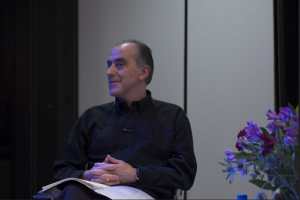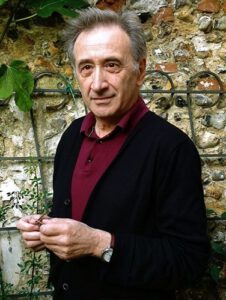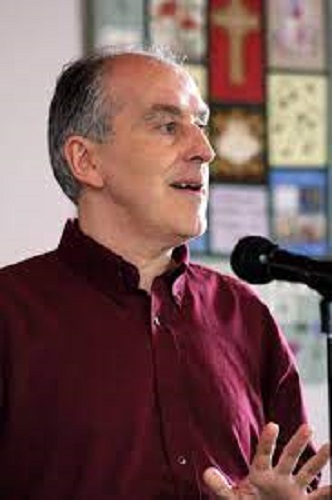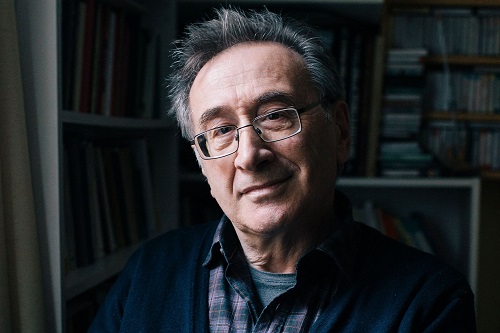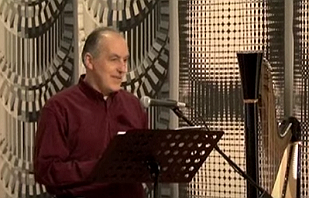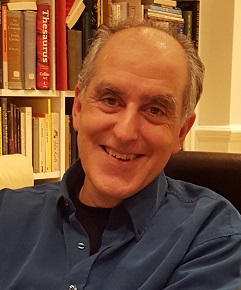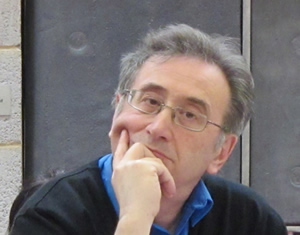De Engelse dichter en schrijver Mario Petrucci werd geboren op 29 november 1958 in Londen. Zie ook alle tags voor Mario Petrucci op dit blog.
Fence
This side of the fence
is clean. That side
dirty. Understand?
You must forget
that soil is like skin.
Or interlocking scales
on a dragon. Dirty
Clean – is all that matters
here. Imagine a sheet
of glass coming down
from the sky. It’s easy
no? On this side
you can breathe
freely. Your cow can
eat the grass. You can
have children. That side
you must wear a mask
and change the filter
every four hours.
You ask – What if my cow
leans over the fence?
Personally I say
it depends which end. But
we have no instructions
for that. It is up to you
to make sure your cow
is not so stupid.
Halves
the blade drops
& both half-oranges
rock upon their backs as
beetled species made
zestful but without
the frantic legs
enlarged in heat
to overbrightly dribble
sap in that broken moment
after insect sex which could be
love yet dictates each rolls
apart to undercarriage
straight-grained ex
-posed in falling apart
where one gains access
to tarter matters animal
or vegetable softly to
be consumed for
rind is hard on us
unscooped or what
the starveling leaves
behind or am I for
getting I was once in
heart fruit-perfect & un-
halved?
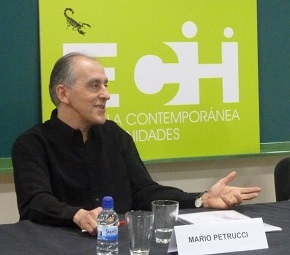
Mario Petrucci (Londen, 29 november 1958)
De Britse dichter en schrijver George Szirtes werd geboren op 29 november 1948 in Boedapest. Zie ook alle tags voor George Szirtes op dit blog.
My Fathers, Coming And Going
Moustaches and grey homburgs: our fathers were
Defined by properties acquired by chance—
Or by divine decree. Standing behind her
In rooms, on stairs, figures of elegance,
They came and went in a murmur of soft voices,
Objects of bewilderment and romance.
How many of them on the premises?
Some worked twelve hours a day in an office
In the city, some placed bristly kisses
On our brows, some would simply embarrass
Us for no particular reason. Their age
Was indeterminate. They would promise
Anything befitting their patronage.
Were all these fathers one? And was it you,
My father, who pushed me in that carriage
I can’t remember now before time flew
And took her away as it will take us all?
I feel myself flying. It’s like passing through
Clouds in an aeroplane in its own bubble
Of air, a slightly bumpy ride down
Towards a runway as we rise and fall
Above the brilliant lights of a big town.
Like A Black Bird
Like a black bird against snow, he flapped
Over the path, his overcoat billowing
In the cold wind, as if he had trapped
The whole sky in it. We watched trees swing
Behind him, lurching drunkenly, blurred
Bare twigs and branches, scrawny bits of string,
And as we gazed ahead the snowflakes purred
In our ears, whispering the afternoon
Which grew steadily darker and more furred.
His face was in shadow, but we’d see it soon.
As he approached it slowly gathered shape:
His nose, in profile, was a broken moon,
His hat a soft black hill bound round with tape,
His raised lapels held his enormous eyes
Between them. The winter seemed to drape
Itself about him as if to apologise
For its own fierceness, hoping to grow warm
Through physical contact, and we, likewise,
Ran towards him, against a grainy storm
Of light and damp. It was so long ago
And life was then in quite another form,
When there were blacker days and thicker snow.

George Szirtes (Boedapest, 29 november 1948)
De Algerijnse, Franstalige, dichter en schrijver Jean Senac werd geboren op 29 november 1926 in Beni Saf in de regio Oran. Zie ook alle tags voor Jean Senac op dit blog.
Out Of My Algeria
Out of my Algeria
they made the prisons taller
than the schools.
They sullied the nocturnal roots
of the People,
the serious Tree
of the remote Berbérie…
They denied the certainty of our Land,
they tore apart Islam, its color,
its fantastical tribes, even the shame
that makes them live.
They denied the Vital Fire, our Flag
They exiled the humble joys of our huts
slow at the return of corn…
Blind! Blind!
On my Infinite People
they applied the whip without understanding
the power of books,
the rhythm of our blood,
our right to sacrifice,
to impatience.
Our whole body refused it.
Prisoners of their forfeiting
they listen to the dark crashes of the sticks
that mingle with the wind
following powder.
Without sight and without words
they assign the precise patrol
among raisins,
its halt under the dark pride of pines
at the detour of furious crossings,
the resumed cry of the Patriots
from which freedom falls like an eagle.
Miroir de l’églantier
Feu de sarments dans tes yeux
Feu de ronces sur tes joues
Feu de silex sur ton front
Feu d’amandes sur tes lèvres
Feu d’anguilles dans tes doigts
Feu de laves sur tes seins
Feu d’oranges dans ton coeur
Feu d’oeillets à ta ceinture
Feu de chardons sur ton ventre
Feu de glaise à tes genoux
Feu de bave sous tes pieds
Feu de sel et feu de boue
un incendie réel
tout droit sur la falaise
un faisceau de saveurs
où je me reconnais
Mère ma ténébreuse
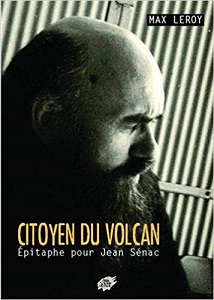
Jean Senac (29 november 1926 – 30 augustus 1973)
Cover
De Italiaanse schrijver, schilder, arts en politicus Carlo Levi werd geboren op 29 november 1902 in Turijn. Zie ook alle tags voor Carlo Levi op dit blog.
Uit: Christ Stopped at Eboli (Vertaald door Frances Frenaye)
“No one has come to this land except as an enemy, a conqueror, or a visitor devoid of understanding. The seasons pass today over the toil of the peasants, just as they did three thousand years before Christ; no message, human or divine, has reached this stubborn poverty. We speak a different language, and here our tongue is incomprehensible. The greatest travelers have not gone beyond the limits of their own world; they have trodden the paths of their own souls, of good and evil, of morality and redemption. Christ descended into the underground hell of Hebrew moral principle in order to break down its doors in time and to seal them up into eternity. But to this shadowy land, that knows neither sin nor redemption from sin, where evil is not moral but is only the pain residing forever in earthly things, Christ did not come. Christ stopped at Eboli.
I arrived at Gagliano one August afternoon in a rattling little car, I was wearing handcuffs and I was escorted by two stalwart servants of the State with vertical red bands on their trousers, and expressionless faces. I arrived reluctantly and ready for the worst, because sudden orders had caused me to leave Grassano where I had been living and where I had learned to know the region of Lucania. It had been hard at first. Grassano, like all the villages hereabouts, is a streak of white at the summit of a bare hill, a sort of miniature imaginary Jerusalem in the solitude of the desert.
I liked to climb to the highest point of the village, to the wind-beaten church, where the eye can sweep over an endless expanse in every direction, identical in character all the way around the circle. It is like being on a sea of chalk, monotonous and without trees. There are other villages, white and far away on the tops of their hills, Irsina, Craco, Montalbano, Salandra, Pisticci, Grottole, Ferrandina, the haunts and caves of the brigands; and beyond the reach of vision lies the sea, and Metaponto, and Taranto. I felt that I had come to understand the hidden virtues of this bare land and to love it; I had no mind to change. I am by nature sensitive to the pangs of separation and for this reason I was anything but well disposed toward the new village where I had to adapt myself to living. I looked forward, however, to the trip from one locality to the other and to the chance of seeing places I had heard so much about, and had pictured in fancy, beyond the mountains hemming in the Basento Valley.”
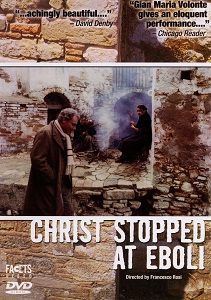
Carlo Levi (29 november 1902 – 4 januari 1975)
Poster voor de gelijknamige film uit 1979
De Belgische schrijver Jean-Philippe Toussaint werd op 29 november 1957 geboren in Brussel. Zie ook alle tags voor Jean-Philippe Toussaint op dit blog.
Uit: De waarheid omtrent Marie (Vertaald door Marianne Kaas)
“Later, terugdenkend aan de duistere uren van die gloeiend hete nacht, drong het tot me door dat we, Marie en ik, op hetzelfde moment de liefde hadden bedreven, maar niet met elkaar. Op een bepaald tijdstip van die nacht – het was de eerste warme periode van het jaar, die abrupt had ingezet, drie dagen achtereen 38°C in Parijs en omstreken, en de temperatuur kwam nooit onder de 30°C – bedreven Marie en ik de liefde in Parijs, in appartementen hemelsbreed op nauwelijks een kilometer van elkaar verwijderd. Aan het begin van de avond kwam de gedachte uiteraard niet bij ons op, en ook later niet, of op enig ander moment, het was simpelweg ondenkbaar, dat we elkaar die nacht zouden zien, dat we voor het aanbreken van de dag samen zouden zijn, en dat we elkaar zelfs even zouden omhelzen in onze flat, in de donkere gang waar alles verstoord was. Gezien het tijdstip waarop Marie thuiskwam (in ons huis, of eigenlijk in haar huis, ik zou nu haar moeten zeggen, want al bijna vier maanden woonden we niet meer onder hetzelfde dak), en gezien het feit dat ik om vrijwel dezelfde tijd was teruggekeerd, niet alleen, ik was niet alleen – maar met wie ik was doet weinig ter zake, daar gaat het niet om – in de kleine tweekamerflat waarin ik sinds we uit elkaar waren gegaan mijn intrek had genomen, zal het naar alle waarschijnlijkheid bij benadering twintig over een, op z’n laatst halftwee ’s nachts zijn geweest toen Marie en ik die nacht in Parijs op hetzelfde moment de liefde bedreven, beiden lichtelijk aangeschoten, onze warme lichamen in het schemerduister, het raam waardoor geen zuchtje frisse lucht de kamer binnenkwam, wijd open. De lucht, die roerloos was, zwaar, onweersachtig, koortsig haast, verkoelde de atmosfeer niet, maar versterkte de lichamen eerder in het passieve en extreme gevoel van benauwdheid veroorzaakt door de hitte. Het was nog voor twee uur ’s nachts – dat weet ik, ik heb gekeken hoe laat het was toen de telefoon ging. Maar wat de precieze chronologie van die nacht betreft houd ik me maar liever op de vlakte, want het gaat toch om het lot van een man, of om zijn dood, nog lang zou niet bekend zijn of hij in leven zou blijven of niet.”
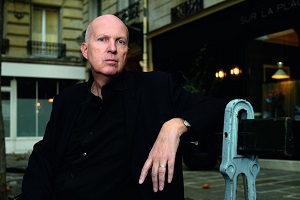
Jean-Philippe Toussaint (Brussel, 29 november 1957)
De Ierse schrijver C. S. Lewis werd geboren op 29 november 1898 in Belfast. Zie ook alle tags voor C. S. Lewis op dit blog.
Uit: The Business of Heaven
“Restoration of the Bible on Its Own Terms
January 29
Unless the religious claims of the Bible are again acknowledged, its literary claims will, I think, be given only ‘mouth honour’ and that decreasingly. For it is, through and through, a sacred book. Most of its component parts were written, and all of them were brought together, for a purely religious purpose. It contains good literature and bad literature. But even the good literature is so written that we can seldom disregard its sacred character. It is easy enough to read Homer while suspending our disbelief in the Greek pantheon; but then the Iliad was not composed chiefly, if at all, to enforce obedience to Zeus and Athene and Poseidon. The Greek tragedians are more religious than Homer, but even there we have only religious speculation or at least the poet’s personal religious ideas; not dogma. That is why we can join in. Neither Aeschylus nor even Virgil tacitly prefaces his poetry with the formula ‘Thus say the gods’. But in most parts of the Bible everything is implicitly or explicitly introduced with ‘Thus saith the Lord’. It is, if you like to put it that way, not merely a sacred book but a book so remorselessly and continuously sacred that it does not invite, it excludes or repels, the merely aesthetic approach. You can read it as literature only by a tour de force. You are cutting the wood against the grain, using the tool for a purpose it was not intended to serve. It demands incessantly to be taken on its own terms: it will not continue to give literary delight very long except to those who go to it for something quite different. I predict that it will in the future be read as it always has been read, almost exclusively by Christians.
What Are We to Make of Christ?
February 1
`What are we to make of Christ?’ There is no question of what we can make of Him, it is entirely a question of what He intends to make of us. You must accept or reject the story. The things He says are very different from what any other teacher has said. Others say, ‘This is the truth about the universe. This is the way you ought to go’, but He says, ‘I am the Truth, and the Way, and the Life.’ He says, ‘No man can reach absolute reality, except through Me. Try to retain your own life and you will be inevitably ruined. Give yourself away and you will be saved.’ He says, ‘If you are ashamed of Me, if, when you hear this call, you turn the other way, I also will look the other way when I come again as God without disguise. If anything whatever is keeping you from God and from Me, whatever it is, throw it away. If it is your eye, pull it out. If it is your hand, cut it off. If you put yourself first you will be last. Come to Me everyone who is carrying a heavy load, I will set that right. Your sins, all of them, are wiped out, I can do that. I am Rebirth, I am Life. Eat Me, drink Me, I am your Food. And finally, do not be afraid, I have overcome the whole universe.” That is the issue.”
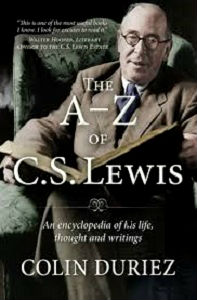
C.S. Lewis (29 november 1898 – 22 november 1963)
Cover
De Duitse dichter en schrijver Wilhelm Hauff werd geboren inStuttgart op 29 november 1802. Zie ook alle tags voor Wilhelm Hauff op dit blog.
Uit: Der junge Engländer oder Der Affe als Mensch
„Im südlichen Teil von Deutschland liegt das Städtchen Grünwiesel, wo ich geboren und erzogen bin. Es ist ein Städtchen, wie sie alle sind. In der Mitte ein kleiner Marktplatz mit einem Brunnen, an der Seite ein kleines altes Rathaus, umher auf dem Markt das Haus des Friedensrichters und der angesehensten Kaufleute, und in ein paar engen Straßen wohnen die übrigen Menschen. Alles kennt sich, jedermann weiß, wie es da und dort zugeht, und wenn der Oberpfarrer oder der Bürgermeister oder der Arzt ein Gericht mehr auf der Tafel hat, so weiß es schon am Mittagessen die ganze Stadt. Nachmittags kommen dann die Frauen zueinander in die Visite, wie man es nennt, besprechen sich bei starkem Kaffee und süßem Kuchen über diese große Begebenheit, und der Schluß ist, daß der Oberpfarrer wahrscheinlich in die Lotterie gesetzt und unchristlich viel gewonnen habe, daß der Bürgermeister sich »schmieren« lasse, oder daß der Doktor vom Apotheker einige Goldstücke bekommen habe, um recht teure Rezepte zu verschreiben. Ihr könnet Euch denken, wie unangenehm es für eine so wohleingerichtete Stadt wie Grünwiesel sein mußte, als ein Mann dorthin zog, von dem niemand wußte, woher er kam, was er wollte, von was er lebte. Der Bürgermeister hatte zwar seinen Paß gesehen, und in einer Kaffeegesellschaft bei Doktors geäußert, der Paß sei zwar ganz richtig visiert von Berlin bis nach Grünwiesel, aber es stecke doch was dahinter; denn der Mann sehe etwas verdächtig aus. Der Bürgermeister hatte das größte Ansehen in der Stadt; kein Wunder, daß von da an der Fremde als eine verdächtige Person angesehen wurde. Und sein Lebenswandel konnte meine Landsleute nicht von dieser Meinung abbringen. Der fremde Mann mietete sich für einige Goldstücke ein ganzes Haus, das bisher öde gestanden, ließ einen ganzen Wagen voll sonderbarer Gerätschaften, als Öfen, Kunstherde, große Tiegel und dergleichen hineinschaffen und lebte von da an ganz für sich allein. Ja, er kochte sich sogar selbst, und es kam keine menschliche Seele in sein Haus als ein alter Mann aus Grünwiesel, der ihm seine Einkäufe in Brot, Fleisch und Gemüse besorgen mußte. Doch auch dieser durfte nur in die Flur des Hauses kommen, und dort nahm der fremde Mann das Gekaufte in Empfang.
Ich war ein Knabe von zehen Jahren, als der Mann in meiner Vaterstadt einzog, und ich kann mir noch heute, als wäre es gestern geschehen, die Unruhe denken, die dieser Mann im Städtchen verursachte. Er kam nachmittags nicht wie andere Männer auf die Kugelbahn, er kam abends nicht ins Wirtshaus, um wie die übrigen bei einer Pfeife Tabak über die Zeitung zu sprechen.“
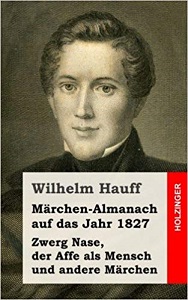
Wilhelm Hauff (29 november 1802 – 18 november 1827)
Cover
De Amerikaanse schrijfster Louisa May Alcott werd geboren op 29 november 1832 in Germantown, Pennylvania. Zie ook alle tags voor Louisa May Alcott op dit blog.
Uit: Little Men. Life at Plumfield With Jo’s Boys
“While Nat takes a good long sleep, I will tell my little readers something about the boys, among whom he found himself when he woke up.
To begin with our old friends. Franz was a tall lad, of sixteen now, a regular German, big, blond, and bookish, also very domestic, amiable, and musical. His uncle was fitting him for college, and his aunt for a happy home of his own hereafter, because she carefully fostered in him gentle manners, love of children, respect for women, old and young, and helpful ways about the house. He was her right-hand man on all occasions, steady, kind, and patient; and he loved his merry aunt like a mother, for such she had tried to be to him.
Emil was quite different, being quick-tempered, restless, and enterprising, bent on going to sea, for the blood of the old vikings stirred in his veins, and could not be tamed. His uncle promised that he should go when he was sixteen, and set him to studying navigation, gave him stories of good and famous admirals and heroes to read, and let him lead the life of a frog in river, pond, and brook, when lessons were done. His room looked like the cabin of a man-of-war, for every thing was nautical, military, and shipshape. Captain Kyd was his delight, and his favorite amusement was to rig up like that piratical gentleman, and roar out sanguinary sea-songs at the top of his voice. He would dance nothing but sailors’ hornpipes, rolled in his gait, and was as nautical in conversation to his uncle would permit. The boys called him “Commodore,” and took great pride in his fleet, which whitened the pond and suffered disasters that would have daunted any commander but a sea-struck boy.”
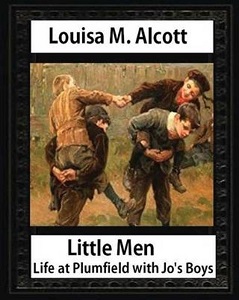
Louisa May Alcott (29 november 1832 – 6 maart 1888
Cover
De Oostenrijkse dichter en schrijver Franz Stelzhamer werd geboren in Großpiesenham op 29 november 1802. Zie ook alle tags voor Frans Stelzhammer op dit blog.
Uit: Der blinde Knabe
„Wilhelm war ein lieber, gemütlicher Knabe. Er mochte jetzt sieben Jahre alt sein und machte seinen guten Eltern, vorzüglich der Mutter, die er den ganzen Tag nicht verließ, ebenso viele Freude als heimlichen Kummer. Freude machte ihnen seine Folgsamkeit und sanfte Manier, den Kummer aber verursachte ihnen des Knaben von Geburt mitgebrachtes Unglück – denkt euch Kinder, der sonst so wohlgestaltete, liebenswürdige Wilhelm war blind geboren.
Wenn seine Geschwister und die anderen Kinder im Frühlinge auf dem weichen Grase herumsprangen, bunte Blümchen pflückten oder den schönen Schmetterlingen nachjagten, mußte Wilhelm allein im Grase sitzen bleiben und froh sein, wenn Bruder August oder des Nachbars flinkes Lenchen in der Eile ihm einige Blumen zuwarfen, die er dann mit seinen kleinen Händchen so leise und verständig betastete und abgriff, daß ihm von der Wurzel bis an das Ende der Krone kein Blättchen noch so fein, kein Staubfaden, wie zart er auch war, entgehen konnte.
Wenn er dann alles um ihn herum so fleißig befühlt und abgetastet hatte, war er oft so freudig im Herzen bewegt, daß er vom Boden aufspringen, im kleinen Kreise auf dem Grase herumtrippeln und mit den Händen wedeln mußte, als wenn er laufen und hurtig herumfliegen wollte vor Frühlingsluft und innigem Entzücken.
»August!« rief er dann, »Lenchen! kommt her zu mir, ich muß euch etwas sagen, etwas zeigen!« – Aber du mein Himmel, wo waren indessen August und Lenchen hingesprungen?
Da eilte dann die Mutter zu ihm und fragte wehmütig-mild: »Was denn Wilhelm, was ist denn?« Und, nach ihr langend, der allzeit Guten und Getreuen, und ihren Hals umschlingend, jubelte er: »o Mutter, die Blumen sind so weich, weicher noch als dein Samtkissen und so zart und fein wie deine Wangen!« Dann küßte er sie und streichelte die Blumen.
Dann aber, wenn sein Freudentaumel vorüber war, ging es an ein Fragen, was dies, das und jenes sei. Gleich darauf kamen »Wie?« und »Warum?« so häufig und mannigfach, daß die gute Mutter ein Gelehrter mit etlichen Zungen hätte sein müssen, um dem wißbegierigen Knaben alles vollständig zu beantworten.
Am allerschwersten, wie leicht zu denken, ging es ihr, wenn die andern Kinder plötzlich ausriefen: »Ach, das ist so schön rot, blau, gelb u. dgl.!« Und sie hätte dann dem kleinen Wilhelm begreiflich machen sollen, was – rot, blauweiß usw. sei. Oder, wie Sonne, Mond und Sterne aussehen; wie groß sie seien und wie das Weltmeer, wovon neulich der Lehrer etwas erwähnte, eigentlich beschaffen. – Was denn der Bach für Füße habe, daß er so schnell läuft, und warum er – der Bach – nicht deutlicher spreche usw. Das waren fürwahr Aufgaben für die Mutter!“
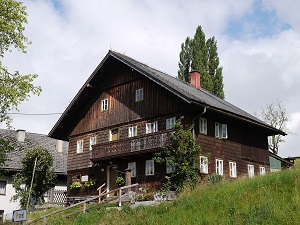
Franz Stelzhamer (29 november 1802 – 14 juni 1874)
Stelzhamers geboortehuis in Großpiesenham
Zie voor nog meer schrijvers van de 29e november ook mijn blog van 29 november 2015 deel 2 en eveneens deel 3.
